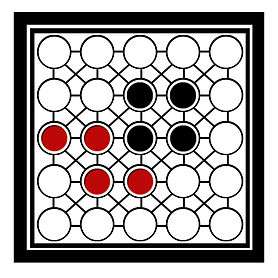Teeko

Teeko is an abstract strategy game invented by John Scarne in 1937 and rereleased in refined form in 1952 and again in the 1960s. Teeko was marketed by Scarne's company, John Scarne Games Inc.; its quirky name, he said, borrowed letters from Tic-tac-toe, Chess, Checkers, and Bingo. [1]
Gameplay
The Teeko board consists of twenty-five spaces arranged in a five-by-five grid. There are eight markers in a Teeko game, four black and four red. One player, "Black" plays the black markers, and the other, "Red", plays the red. Black moves first and places one marker on any space on the board. Red then places a marker on any unoccupied space; black does the same; and so on until all eight markers are on the board. The object of the game is for either player to win by having all four of his markers in a straight line (vertical, horizontal, or diagonal) or on a square of four adjacent spaces. (Adjacency is horizontal, vertical, or diagonal, but does not wrap around the edges of the board.) If neither player has won after the "drop" (when all eight pieces are on the board), then they move their pieces one at a time, with Black playing first. A piece may be moved only to an adjacent space.
The rules, as summarized above, are very simple, but the strategy is complicated enough to fill a book, Scarne on Teeko, by Scarne (1955).[2] Nonetheless, Guy Steele solved the game (i.e., showed what must occur if both players play wisely) via computer in 1998: he found that neither player can force a win.[3]
Variations
There are sixteen variations of Teeko, such as Advanced Teeko, which have slightly different rules. All sixteen are outlined in Scarne on Teeko; the rules above are for "Standard Teeko" (or "Teeko"). Steele showed that Advanced Teeko is a win for Black (assuming, again, that both players play perfectly), as is one other variation, but the other fourteen are draws.
Opera
Mark Owen composed a short opera, "Teeko" for tenor, chorus, and piano, based on the game, including songs such as "Teeko Is Rapidly Sweeping the World" and "Why Do You Recommend Teeko for the Sick?" The first (and believed only) performance of Teeko was produced by Alan Sheppard and given on 29 January 1991 in the Old Combination Room, Trinity College, Cambridge, hosted by the Trinity Mathematical Society. The performance lasted 30 minutes (including a 20-minute interval), and was preceded by an interview of composer and producer by David Quest.
References
- ↑ Eskin, Blake. "A world of games: Cards and gambling authority John Scarne claimed to have invented one of the greatest board games of all time. Was he bluffing?" Washington Post, July 15, 2001, p. W18.
- ↑ Scarne, John (1955). Scarne on Teeko. New York: Crown Publishers.
- ↑ Epstein, Richard A. (2012) The Theory of Gambling and Statistical Logic, 2nd ed. Academic Press, p. 341.